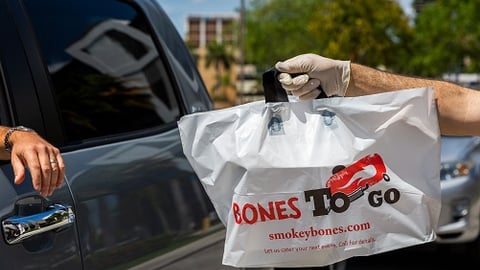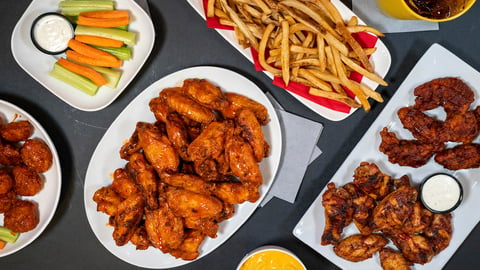Smokey Bones' Digital Transformation Powers Off-Prem Pivot
Not many restaurant executives can say they greenlit the complete multimillion-dollar overhaul of a company’s technology infrastructure amidst a global pandemic and realized a 100% ROI in six months, but James O’Reilly can. As chief executive of Aventura, Florida-based Smokey Bones, O’Reilly and chief digital and technology officer, Brian Wallunas, have transformed the company’s digital infrastructure from A to Z, and as a result have driven customer engagement and improved productivity and operations — allowing its employees to focus on serving up genuine hospitality.
Any Time/Any Where
Once O’Reilly, Wallunas and the executive team had realigned the company’s strategic imperatives it became abundantly clear the antiquated technology could not support the Any Time/Any Where vision that was now the company’s driving force.
“Shortly after I arrived, it became obvious that Smokey Bones needed a complete overhaul of its technology infrastructure — it was greatly needed,” said Wallunas. “It turned out to be a very fortuitous decision — once we were faced with the daunting challenges of COVID-19 a short time later. Because of the changes we had made concerning our technology infrastructure, we were prepared to operate from a completely digital standpoint, which put us exactly where the customers needed us to be.”
Wallunas’ bold, transformative technology moves required systemwide changes that are extensive by any measure: hardware upgrade, software upgrade, security enhancements, telecom upgrade, third-party delivery integration, and a new ecommerce platform. Smokey Bones’ digital infrastructure revamp was an all-consuming task that required careful planning, testing and cooperation from the entire 62-unit system.
“The older infrastructure simply could not support our vision. As a result, we transformed and upgraded everything so that we could drive e-commerce, off-premise and guest engagement,” noted Wallunas, who joined Smokey Bones in 2019 following successful careers at Arby’s, Domino’s, and The Coca-Cola Company.
“When the pandemic hit, like many of our competitors, we turned our focus to our off-premise business,” he says. “This included activating new service methods such as curbside pick-up. We piloted Contactless Pay and Text-2-Pay to provide our guests alternative methods to transact. And we accelerated our strategy, compressing a six-month timeline down to six weeks in some instances, to integrate third-party delivery orders and launch a new direct-to-consumer eCommerce platform.”
Virtual Brands Heat Up
According to 2021 State of Digital for Restaurants, 50% of enterprise brands will launch some form of ghost, host or cloud kitchen concept in 2021, a market which is expected to reach $1 trillion by 2030.
Smokey Bones is among the restaurants looking to boost incremental revenue, expanding brand reach and attracting new customers by adding virtual brands. Genghis Grill, Dickey’s Barbecue Pit, HOA Brands, Muscle Maker Grill, Fazoli's, Brinker International, Nathan's Famous, Chuck E. Cheese and Dog Haus have launched virtual brands in recent months, as demand for off-premises dining soared. One of the most advantageous is Concept Entertainment Group's online food hall concept, which received HT’s Industry Hero Award.
To further accelerate its digital business and off-premise focus, Smokey Bones introduced two virtual brands, The Wing Experience (www.TheWingX.com) and The Burger Experience (www.burgerXorder.com). Guests can not only order the virtual brands through third-party delivery marketplaces but also direct through their dedicated eCommerce website. “A direct-to-consumer digital experience was always part of our go to market strategy to efficiently grow these great brands along with building a relationship with our guests,” said O’Reilly.
Digital Transformation
In a logical sequence, Wallunas led the transformation beginning with the introduction of new ordering experiences that enabled guests to order ahead and customize their order for curbside pickup, in-restaurant pickup, and now delivery in partnership with Door Dash. The new e-commerce platform, which drives increased guest engagement and margin improvement has nearly tripled following the pandemic and is the fastest growing off-premise sales channel.
According to O’Reilly and Wallunas, Smokey Bones carefully selects its partners by not only reviewing the company’s capabilities but also its values and vision as an organization. “We want to partner with organizations who can execute today but more importantly in the future, and get excited about What’s next and What’s possible,” said Wallunas. Smokey Bones likewise aligned with Omnivore as its third-party marketplace integration partner for all of its brands including The Wing Experience and recent launch of The Burger Experience, along with ToGo Technologies as its direct-to-consumer eCommerce platform. “Omnivore and ToGo Technologies are market leaders in their respective fields and together they are a powerful force providing innovative digital solutions at scale,” says Wallunas.
“My intention is for Smokey Bones to be the digital leader in casual dining. And to achieve this, we are focused on our Any Time /Any Where vision, which puts our guests in control of their dining experience. Step one was to rebuild our infrastructure and introduce new ordering experiences that enable our guests to order ahead and customize their order.
Looking ahead, we see the opportunity to use technology to elevate service and put greater control and visibility in our guest’s hand for the dine-In experience. Imagine reserving your table in advance, similar to how you would choose a seat on an airplane or movie theater. We want to give our guests the control to select a table or a booth, pre-order appetizers, their favorite beverage and more.”
Moving forward, the company has a growing list of technological advances to implement. On the company’s radar for 2021 includes expanding their CRM capabilities and first-party data to drive personalized communication and rewards with guests, along with piloting a table management solution to drive reservations and a digital waitlist.
"James understands technology and what it can do to drive guest engagement and transactions,” said Wallunas. “It can vastly improve productivity for our operators, which allows us to improve our service levels. At this point in time we have surpassed our goals, and we are vastly outpacing much larger companies in the casual dining space.”












